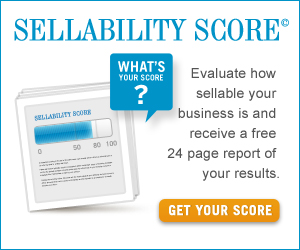Republished with permission from Built to Sell Inc.
 You may be years away from selling your business, but it’s never too early to understand what the process involves.
You may be years away from selling your business, but it’s never too early to understand what the process involves.
If you have ever promised your child a treat in return for good behaviour, you know all about negotiating leverage. When selling an attractive business, you also have leverage—but only up to the point where you sign a letter of intent (LOI), which almost always includes a “no shop” clause requiring you to terminate discussions with other potential buyers while your newfound “fiancé” does due diligence.
After you sign the LOI, however, the balance of power in the negotiation swings heavily in favour of the buyer, who can then take their time investigating your company. At the same time, with each passing day, you will likely become more psychologically committed to selling your business. Savvy buyers know this and can drag out diligence for months, coming up with things that justify lowering their offer price or demanding better terms.
With your leverage diminished and other suitors sidelined, you are then left with the unattractive options of either accepting the inferior terms or walking away.
Here are seven things you can do—before you even put your business up for sale, and before signing an LOI—to minimize the chances of your deal dragging on for months and becoming watered down:
1. Make sure your customer contracts have “successor” clauses.
Have customers sign long-term, standardized contracts, including a clause stating that the obligations of the contract survive any change in company ownership.
 2. Nurture and prepare a group of 10 to 15 “reference-able” customers.
2. Nurture and prepare a group of 10 to 15 “reference-able” customers.
Acquirers will want to ask your customers why they do business with you and not your competitors. Before you sign the LOI, cultivate a group of customers to act as references.
3. Ensure your management team is all on the same page.
During due diligence, acquirers will want to interview your managers without you in the room. They want to find out if everyone in your company is pulling in the same direction.
4. Consider getting audited financials.
An acquirer will have more confidence in your numbers and will perceive less risk if your books are audited by a recognized accounting firm.
5. Disclose the risks up front.
Every company has some risk factors. Disclose any legal or accounting hiccups before you sign the LOI.
6. Negotiate down the due diligence period.
Most acquirers will ask for a period of 60 or 90 days to complete their due diligence. You may be able to negotiate this down to 45 days—perhaps even 30 with some financial buyers. If nothing else, you’ll alert the acquirer to the fact that you’re not willing to see the diligence drag out past the agreed-to close date.
7. Make it clear there are others at the table.
Explain that, while you think the acquirer’s offer is the strongest and you intend to honour the ‘no shop’ agreement, there are other interested parties at the table.
If you take all seven of these steps, you will protect the value of your business as the balance of power in the negotiations to sell your company swings from you to the buyer.
Why not find out now if your business is sellable?
This free online tool is the only no-risk step you can take to determine if your business is ready to get full value. Fast-track your analysis by taking advantage of this free, no-obligation free online tool.
This Sellability Score you instantly receive is a critical component to any business owner’s complete financial plan and is something that, until now, we have only made available to existing clients.
However, we recognized that there is value in knowing in advance of working with a financial planner whether or not your largest asset is ready to be exchanged for your retirement nest egg. Our view is that you are better to learn more about your businesses sellability today and find out how your business scores on the eight key attributes so that you can ensure you obtain full value.
If your business part of your retirement plan, finding out your sellability score will be the best 10 min. you could ever spend working “on” your business.
 For more free information on Creating A Business Owner’s Dream Financial Plan, you can listen to a free, eight part series we did exclusively for business owners. The show is also available to subscribe to for free via iTunes.
For more free information on Creating A Business Owner’s Dream Financial Plan, you can listen to a free, eight part series we did exclusively for business owners. The show is also available to subscribe to for free via iTunes.
 I interview Jason Kwiatkowski, Partner at the firm Valuation Support Partners to discuss the important aspects of business valuations and why they are so important to the growth of your business.
I interview Jason Kwiatkowski, Partner at the firm Valuation Support Partners to discuss the important aspects of business valuations and why they are so important to the growth of your business.




 In this video, I speak with Mike Flux, VP of Connor Clark & Lunn Private Capital to provide an update on the alternative strategies that they are using in their portfolios, to help reduce the effects of the current volatility without sacrificing returns.
In this video, I speak with Mike Flux, VP of Connor Clark & Lunn Private Capital to provide an update on the alternative strategies that they are using in their portfolios, to help reduce the effects of the current volatility without sacrificing returns.
 5. Who buys what you sell?
5. Who buys what you sell? In this video, I speak to Jennifer Jacobs, President of LTCI Consulting Inc. to chat about the expectation of changes of living benefits / life insurance, in terms of what we see in the market place and what we can do to take advantage on what is available today.
In this video, I speak to Jennifer Jacobs, President of LTCI Consulting Inc. to chat about the expectation of changes of living benefits / life insurance, in terms of what we see in the market place and what we can do to take advantage on what is available today. You may be years away from selling your business, but it’s never too early to understand what the process involves.
You may be years away from selling your business, but it’s never too early to understand what the process involves. 2. Nurture and prepare a group of 10 to 15 “reference-able” customers.
2. Nurture and prepare a group of 10 to 15 “reference-able” customers.



